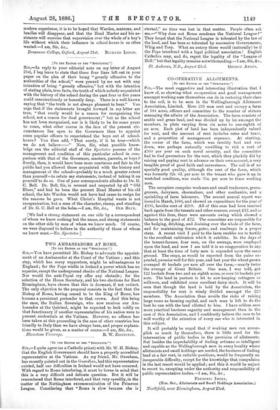[TO THE EDITOR OF THE " SPECTATOR...] SIR, In reply
to your editorial note on my letter of August 21st, I beg leave to state that those four lines left out in your paper on the plea of their being " grossly offensive to the anthorities of the school," were penned by me not with any intention of being " grossly offensive," but with the intention of stating plain, true facts, the truth of which nobody acquainted with the history of the school during the past four or five years could conscientiously or honestly deny. There is a well-known saying that "the truth is not always pleasant to hear." You urge that if the statements brought forward in my letter are true, " that surely would be a reason for reorganising the school, not a reason for dual government ;" but as the school has not been reorganised, nor is it likely to be for some years to come, what other course in the face of the present cir- cumstances lies open to the Governors than to appoint some popular officers to superintend the boys out of school- hours You then add, " That surely, if it be true—which we do not believe—" Now, Sir, what possible know- ledge can the editorial staff of the Spectator possess of the management and condition of this particular school in com- parison with that of the Governors, masters, parents, or boys ? Surely, then, it would have been more courteous and fair to the public had you allowed those acquainted with the history and management of the school—probably to a much greater extent than yourself—to refute my statements; instead of taking it on yourself to do so. One of your correspondents alludes to Dr. G. C. Bell. Dr. Bell, Sir, is revered and respected by all " Old Blues," and had he been the present Head Master of his old school, the late Warden would not have had cause to resign for the reasons he gave. What Christ's Hospital wants is not reorganisation, but a man of the character, stamp, and standing of Dr. G. C. Bell at the helm.—I am, Sir, &c., OLD BLUE.
[We had a strong statement on one side by a correspondent of whom we know nothing but the name, and strong statements on the other side by men of whom we know much. Of course, we were disposed to believe in the authority of those of whom we know most.—ED. Spectator.]


































 Previous page
Previous page